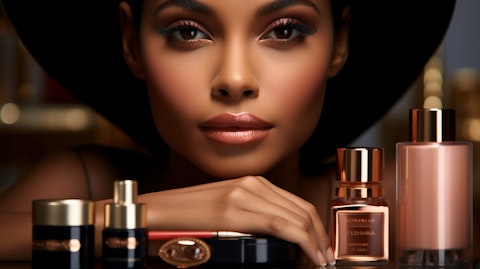We recently published a list of 12 Best Beauty Stocks to Buy According to Hedge Funds. In this article, we are going to take a look at where Coty Inc. (NYSE:COTY) stands against other best beauty stocks to buy according to hedge funds.
According to a report by McKinsey, in 2023, the global beauty market expanded by 10%, reaching $446 billion in retail sales, mostly due to price hikes rather than volume advances. North America and Europe grew steadily, but the Middle East & Africa (18%) and Latin America (17%) grew at the quickest rates, with China trailing behind at 3% because of poor consumer sentiment. The market is expected to reach $590 billion by 2028 at a compound annual growth rate (CAGR) of 6%, with growing markets and Asia-Pacific driving development. Skincare (44% of the market) had stable growth, while fragrance (14%) was the category with the quickest rate of growth, driven by luxury niche brands. Beauty businesses must employ premiumization, innovation, and skin care-infused cosmetics to transition from price-driven to volume-driven growth to maintain momentum, especially in high-growing markets like the Middle East and India.
A significant contributor to the American economy, the beauty industry generated $94.36 billion in sales in 2023 and employed 4.6 million people in manufacturing, retail, and distribution. Costs increased by 6.5% due to inflation, which affected customer spending patterns and raised demand for reasonably priced “dupes.” In 2023, e-commerce beauty sales reached $21.3 billion, a reflection of changing consumer preferences. Despite economic downturns, consumers continue to make little luxury purchases, a phenomenon known as the “lipstick effect.” Private equity investors show their confidence in the potential of the beauty industry by continuing to invest in scalable beauty brands. Disruptions in the supply chain have pushed up near-shoring initiatives, which have helped create jobs in the United States. DC Advisory states that “the beauty sector’s adaptability ensures long-term relevance and economic impact.”
Recently, as the holiday season approached, the U.S. beauty business was still doing well, with mass market sales up 2% year over year and the prestige market expanding 7% to $22.8 billion, according to Circana. Lipcare sales increased 21% in dollars and 23% in units, due to high demand for tinted balms and oils. As a result of consumers’ price sensitivity, mid-range skincare brands are expanding six times faster than luxury skincare. Sales of fragrances surged 14%, with premium brands up 15%, while prestige hair care climbed 8%, driven by style and scalp care items. According to 29% of customers, the Christmas season is a critical time to purchase beauty presents. Larissa Jensen, global beauty industry advisor at Circana stated:
“Prestige beauty epitomizes the indulgence in little luxuries and acts as an indicator of the consumer mindset for the beauty industry overall,” “This holiday season, its resiliency will be tested. There has been some pullback in spending throughout 2024, but big increases in prestige beauty spend from higher-income households with children under 18-years-old indicate parents are indulging Gen Alpha with these products. The social media virality of this new generation of beauty enthusiasts shows no sign of slowing and could be a pivotal holiday growth driver.”
The increasing integration of artificial intelligence (AI) appears to have affected every business, and the beauty industry is no different. AI is already changing the way beauty brands function, and its impact is only going to increase. According to a survey by Perfect Corp., 77% of experts in the beauty industry think that conversational AI agents—like chatbots and virtual assistants—offer unparalleled possibilities for customizing encounters. These tools enable accurate answers to questions, individualized product recommendations, and immediate, round-the-clock customer support.

A close-up of a woman’s face wearing a beauty product, highlighting the company’s range of luxury items.
Methodology
We sifted through holdings of beauty ETFs and online rankings to form an initial list of 20 beauty stocks. From the resultant dataset, we chose 12 stocks with the highest number of hedge fund investors, using Insider Monkey’s database of 900 hedge funds in Q3 2024 to gauge hedge fund sentiment for stocks. We have used the stock’s Revenue Growth Rate (year-over-year) as a tie-breaker in case two or more stocks have the same number of hedge funds invested.
Why are we interested in the stocks that hedge funds pile into? The reason is simple: our research has shown that we can outperform the market by imitating the top stock picks of the best hedge funds. Our quarterly newsletter’s strategy selects 14 small-cap and large-cap stocks every quarter and has returned 275% since May 2014, beating its benchmark by 150 percentage points. (see more details here).
Coty Inc. (NYSE:COTY)
Number of Hedge Fund Holders: 26
One of the Best Beauty Stocks, Coty Inc. (NYSE:COTY) concentrates mostly on color cosmetics (28%) and fragrances (59%), with limited exposure to skincare (5%) and body care (5% of sales). The company’s consumer cosmetics business is centered on acquired mass brands, including Rimmel, CoverGirl, Max Factor, Sally Hansen, and Bourjois; for its fragrance business, it licenses luxury and high-end labels like Gucci, Burberry, Hugo Boss, Davidoff, and Calvin Klein.
Approximately 42% of the beauty company’s sales come from the Americas, 14% from Asia-Pacific, and nearly 44% from Europe. The majority of the stake is held by the German investment group JAB.
Over the past three years, Coty Inc. (NYSE:COTY)’s net revenue has risen consistently as a result of growth in both revenue streams and expansions in profitability margins. In the US, both the mass market and premium beauty channels grew in 2023, but the prestige channel grew more quickly than the mass market channel. To capitalize on this trend, Coty is focusing on its prestige segment by entering the market for prestige cosmetics and building a solid portfolio, such as strategic partnerships with Kim Kardashian and Kylie Jenner.
In Q1 of 2025, the revenue grew by 2% YoY, fueled by growth in prestige fragrances, outperforming the beauty market. Growth is still being driven by Coty Inc. (NYSE:COTY)’s online sales in the first quarter of 2025, with CoverGirl and Rimmel seeing remarkable rises of 40% and 80%, respectively. In Q1, the Prestige segment experienced a 7% growth, caused mostly by the fragrance category. Furthermore, the company has improved its EBITDA margin to around 19%, a gain of 250 basis points over the last three to four years, showing its tremendous progress in margin expansion. The beauty firm is still committed to deleveraging, with the goal of having 2.5x leverage by the end of 2024 and ending the year with less than 3x. The company has also increased its cost-cutting goal to $120 million, focusing on AI-driven demand planning and supply chain efficiency.
Steve Cohen’s Point72 Asset Management was the largest stakeholder in Coty Inc. (NYSE:COTY) among the funds in Insider Monkey’s database at the end of Q3 2024. It owns 3.37 million shares worth $31.62 million as of Q3.
Overall, COTY ranks 12th on our list of best beauty stocks to buy according to hedge funds. While we acknowledge the potential for COTY to grow, our conviction lies in the belief that some AI stocks hold greater promise for delivering higher returns and doing so within a shorter time frame. If you are looking for an AI stock that is more promising than COTY but that trades at less than 5 times its earnings, check out our report about the cheapest AI stock.
READ NEXT: 20 Best AI Stocks To Buy Now and Complete List of 59 AI Companies Under $2 Billion in Market Cap
Disclosure: None. This article is originally published at Insider Monkey.





